“New Conservative Majority” as a Socio-Political Phenomenon
Abstract
Leontiy Byzov – Leading Research Fellow, Institute of Sociology, Russian Academy of Sciences. Address: Bldg. 5, 24/35, Krzhizhanovskii St., Moscow, 117218, Russian Federation. E-mail: leontiy13@mail.ru
Many Russian sociologists acknowledge the rise of conservative values ever since the late 1990s — the turning point most frequently identified as the year of economic default in 1998. However, until 2012 this trend was largely compensated by a strong influence of liberal values both in society as a whole and, to a greater extent, among the political elites. The ‘majority’, on which the authorities relied, could be most likely characterized as centrist, while the more radical groups of liberals and conservatives enjoyed only marginal support. A notable polarization began only a couple of years ago with increased protest activities in the winter of 2011-2012. Having begun more as a political technology aiming to polarize the disgruntled on ideological grounds, this trend soon had a life of its own. A ‘new conservative majority’ suddenly formed, becoming the new more radical support for those currently in power. The events around Crimea and Ukraine have shown that this conservative majority can easily support the radical actions of the state and its anti-West rhetoric.
This article draws on sociological data from surveys by IS RAN and VTsIOM, and attempts to investigate the social roots of this ‘conservative majority’, its inner heterogeneity, its representation of nationalists and liberals, as well as electoral preferences. It shows that the new conservatism is quite ambiguous in the sense that behind this conservative façade hides a consumerist society — far from being conservative
in terms of its lifestyles and consumption patterns. This means that modern Russia’s conservatism is less a retreat to traditions (often proclaimed by the ideologists of this new course), rather it is an organic feature of a modern mass society, enjoying limited access to information and weak political competition. The article studies the dynamics of these values in the last 2-3 years and shows that this major ideological divide has been
quite persistent. It is concluded that the ideology of aggressive conservatism could lead to even further ideological divide in society and pose a serious threat to social stability.






